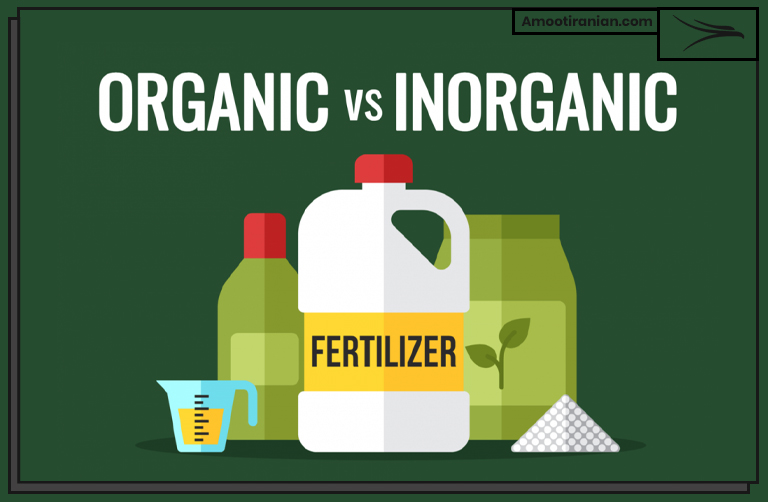.

.
.

Fertilizers are classified as either organic, derived from natural sources like agricultural waste and manure, or inorganic, consisting of synthetic compounds such as nitrogen fertilizers.
.
.
Types of Fertilizers Used in Agriculture
Aforementioned, Fertilizers can be categorized into two main types: organic fertilizers, which are derived from natural sources and inorganic fertilizers, made up of synthetic compounds.
.
1. Organic Fertilizers
Organic fertilizers are derived from natural sources and are typically made from agricultural waste, livestock manure, or organic waste.
These fertilizers improve soil fertility, promote plant growth, and provide other benefits to the soil.
.

.
Some types of organic fertilizers
| Organic Fertilizer | Description | Benefits |
| Compost | Decomposed organic matter | Improves: 1. soil structure 2. water retention 3. nutrient availability |
| Manure | Livestock waste, such as cow or chicken manure | Rich in nitrogen, phosphorus, and potassium |
| Bone Meal | Ground-up animal bones | Good source of phosphorus and calcium |
| Fish Emulsion | Decomposed fish waste | High in nitrogen and other micronutrients |
| Blood Meal | Dried animal blood | High in nitrogen and good for plants with high nitrogen requirements |
| Seaweed | Dried seaweed or kelp | Contains trace elements, promotes root growth, and enhances plant resistance to stress |
| Green Manure | Cover crops, such as clover or alfalfa, that are grown and then tilled into the soil | Adds organic matter to the soil, improves: 1. soil structure 2. increases nutrient availability |
Note that these are just a few examples of the many types of organic fertilizers available. The exact composition of organic fertilizers can vary widely depending on their source and production method.
.
2. Inorganic Fertilizers
Inorganic fertilizers, also known as synthetic fertilizers, are typically made from synthetic compounds and minerals. These fertilizers are designed to provide plants with specific nutrients, such as nitrogen, phosphorus, and potassium, that are essential for growth.
Inorganic fertilizers are manufactured through a chemical process, and their nutrient content is carefully controlled to ensure consistent results.
.
Unlike organic fertilizers, which release nutrients slowly over time as they decompose, inorganic fertilizers are fast-acting and provide an immediate boost to plant growth. Inorganic fertilizers are often used in large-scale agricultural operations, where quick results and precise nutrient control are critical.
Some examples of inorganic fertilizers include:
- Nitrogen Fertilizers: These fertilizers provide plants with nitrogen, which is essential for growth and is often the most limiting nutrient in soils. Examples include ammonium nitrate, urea, and ammonium sulfate.
- Phosphorus Fertilizers: These fertilizers provide plants with phosphorus, which is essential for root growth and flower formation. Examples include triple superphosphate and monoammonium phosphate.
- Potassium Fertilizers: These fertilizers provide plants with potassium, which is essential for overall plant health and stress tolerance. Examples include potassium chloride and potassium sulfate.
Inorganic fertilizers are designed to provide plants with specific nutrients in a precise manner, but they may also have some negative impacts on soil health and the environment.
Overuse of inorganic fertilizers can lead to soil degradation, nutrient runoff, and contamination of waterways.
.
Differences Between Organic and Inorganic Fertilizers
Here’s a table comparing the differences between organic and inorganic fertilizers:
.
| Organic Fertilizers | Inorganic Fertilizers |
| Derived from natural sources, such as animal waste, plant materials, or compost | Made from synthetic compounds and minerals |
| Slow-release of nutrients over time as the organic material decomposes | Fast-acting and provide an immediate boost of nutrients to plants |
| Improve soil structure, water retention, and nutrient availability | Provide specific nutrients in a precise manner, but may have negative impacts on soil health and the environment |
| Rich in micronutrients and trace elements that are often lacking in synthetic fertilizers | Nutrient content is carefully controlled to ensure consistent results |
| Increase soil fertility and promote healthy microbial activity | Can lead to soil degradation and nutrient runoff if overused |
| Typically lower in nutrient content than inorganic fertilizers | Typically higher in nutrient content than organic fertilizers |
| Can be more expensive than inorganic fertilizers | Often less expensive than organic fertilizers |
.
Note that these are general differences and the exact characteristics of organic and inorganic fertilizers can vary depending on the specific products and formulations used. The choice between organic and inorganic fertilizers will depend on your specific needs and goals for your plants and soil.
.

.
How to Choose between Organic and Inorganic Fertilizers?
When choosing between organic and inorganic fertilizers, there are several factors to consider. Here are some things to keep in mind:
Factors to consider when choosing between organic and inorganic fertilizers
| Factor | Organic Fertilizers | Inorganic Fertilizers |
| Nutrient needs | Provide a wider range of nutrients over time as they decompose | Provide specific nutrients in a precise manner |
| Soil health | Improve soil structure, water retention, and nutrient availability | Can have negative impacts on soil health and microbial activity if overused |
| Environmental impact | Generally considered more environmentally friendly, as they rely on natural materials and processes | Can lead to nutrient runoff and contamination of waterways if overused |
| Cost | Can be more expensive than inorganic fertilizers | Often less expensive than organic fertilizers |
| Application frequency | May require more frequent applications due to slower release of nutrients | Typically require fewer applications due to fast-acting nature |
.

Note that these factors are general guidelines and the best choice will depend on your specific situation and goals. It’s important to carefully consider the pros and cons of each type of fertilizer and choose the one that best meets your needs while minimizing negative impacts on the environment and soil health.
